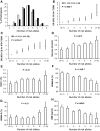Common variants in CDKAL1, CDKN2A/B, IGF2BP2, SLC30A8, and HHEX/IDE genes are associated with type 2 diabetes and impaired fasting glucose in a Chinese Han population
- PMID: 18633108
- PMCID: PMC2551696
- DOI: 10.2337/db08-0047
Common variants in CDKAL1, CDKN2A/B, IGF2BP2, SLC30A8, and HHEX/IDE genes are associated with type 2 diabetes and impaired fasting glucose in a Chinese Han population
Abstract
Objective: Genome-wide association studies have identified common variants in CDKAL1, CDKN2A/B, IGF2BP2, SLC30A8, HHEX/IDE, EXT2, and LOC387761 loci that significantly increase the risk of type 2 diabetes. We aimed to replicate these observations in a population-based cohort of Chinese Hans and examine the associations of these variants with type 2 diabetes and diabetes-related phenotypes.
Research design and methods: We genotyped 17 single nucleotide polymorhisms (SNPs) in 3,210 unrelated Chinese Hans, including 424 participants with type 2 diabetes, 878 with impaired fasting glucose (IFG), and 1,908 with normal fasting glucose.
Results: We confirmed the associations between type 2 diabetes and variants near CDKAL1 (odds ratio 1.49 [95% CI 1.27-1.75]; P = 8.91 x 10(-7)) and CDKN2A/B (1.31 [1.12-1.54]; P = 1.0 x 10(-3)). We observed significant association of SNPs in IGF2BP2 (1.17 [1.03-1.32]; P = 0.014) and SLC30A8 (1.12 [1.01-1.25]; P = 0.033) with combined IFG/type 2 diabetes. The SNPs in CDKAL1, IGF2BP2, and SLC30A8 were also associated with impaired beta-cell function estimated by homeostasis model assessment of beta-cell function. When combined, each additional risk allele from CDKAL1-rs9465871, CDKN2A/B-rs10811661, IGF2BP2-rs4402960, and SLC30A8-rs13266634 increased the risk for type 2 diabetes by 1.24-fold (P = 2.85 x 10(-7)) or for combined IFG/type 2 diabetes by 1.21-fold (P = 6.31 x 10(-11)). None of the SNPs in EXT2 or LOC387761 exhibited significant association with type 2 diabetes or IFG. Significant association was observed between the HHEX/IDE SNPs and type 2 diabetes in individuals from Shanghai only (P < 0.013) but not in those from Beijing (P > 0.33).
Conclusions: Our results indicate that in Chinese Hans, common variants in CDKAL1, CDKN2A/B, IGF2BP2, and SLC30A8 loci independently or additively contribute to type 2 diabetes risk, likely mediated through beta-cell dysfunction.
Figures

References
-
- Owen KR, McCarthy MI: Genetics of type 2 diabetes. Curr Opin Genet Dev 17:239–244, 2007 - PubMed
-
- Frayling TM: A new era in finding type 2 diabetes genes: the unusual suspects. Diabet Med 24:696–701, 2007 - PubMed
-
- Frayling TM: Genome-wide association studies provide new insights into type 2 diabetes aetiology. Nat Rev Genet 8:657–662, 2007 - PubMed
Publication types
MeSH terms
Substances
Grants and funding
LinkOut - more resources
Full Text Sources
Other Literature Sources
Medical
Miscellaneous

